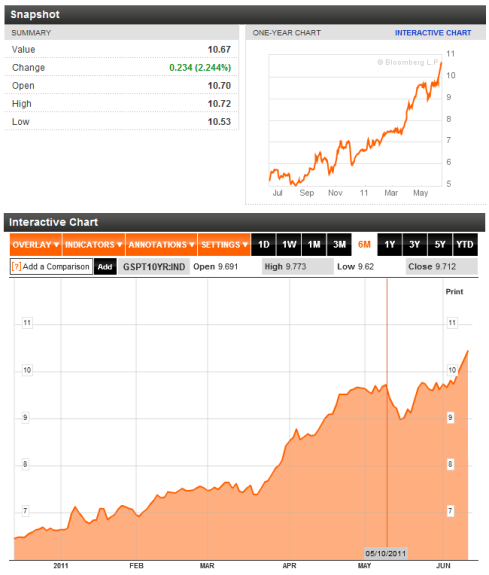Tags: america, consumption, dollar collapse, economic forecasts, economic predictions, gold, goldman sachs, housing crisis, oil, peter schiff, service economy, silver, unemployment
Archive | June, 2011
FSA REPORTS: “abnormal pre-announcement price movements” in 21.2% of 2010 UK deals
19 JunVia Bloomberg:
“Unusual share price movements in the two days before takeovers announced by U.K. companies last year fell 9.4 percent, in a sign that insider trading may be decreasing.
There were ‘abnormal pre-announcement price movements’ before 21.2 percent of the 118 deal notices in the U.K. in 2010, the Financial Services Authority said in its annual report, published yesterday. That was down from 30.6 percent in 2009, and the lowest rate since 2003.
Factors other than insider trading, such as speculation by analysts or the press about an upcoming deal, or information leaks, could be the cause of the share price movements, the regulator said. The FSA has made market abuse and insider trading by top bankers a focus of its enforcement efforts.”
3 MAJOR EM CONCERNS: food, energy and water insecurity
18 JunVia Asia News Network:
“Indonesian President Susilo Bambang Yudhoyono is calling on Asian countries to work together as the ‘moment has come’ to make the region “the continent of the future.
‘I notice that this newfound confidence is not particular to Indonesia. You can see it throughout Asia. In my heart I do believe that Asia’s moment has come, and that a much brighter future lies ahead. But we cannot take this for granted,’ Yudhoyono said in the opening remarks of the WEF at the Shangri-La Hotel in Jakarta on Sunday (June 12).
Second, he said, Asia must address growing pressures from food, energy and water insecurity, as 60 percent of the world’s 7 billion people live in Asia.”
Tourism is booming in Singapore
18 JunVia Business Wire India:
“Singapore’s tourism sector’s strong performance in Q1 2011 as well as the
uptrend in business travel and the MICE industry signal that there is strong
potential for the city-state to emerge as a top tourist destination for 2011,
forecasts Singapore business incorporation portal, http://www.SingaporeSetup.com.
Latest data from the Singapore Tourism Board reveals that Singapore has
experienced an all-time high of 990,000 in international visitorship during the month of February 2011. This number represents a 15.4% growth in visitorship compared to a year ago and brings with it a 19.1% year-on-year growth in gazetted hotel revenue, estimated at S$159 million.
On the back of this announcement, Singapore aims to draw 12-13 million visitors and earn S$22-S$24 billion in tourism receipts this year.
As businesses and entrepreneurs look East to establish their presence in the
region, many flock to Singapore due to its reputation as a financial and
commercial hub in the heart of Asia, sound business practices, efficient and stable governance and proximity to the emerging markets that surround it. Last year alone, Singapore has hosted a strong calendar of international conferences and trade exhibitions including ITB Asia, the Singapore Airshow and Food&HotelAsia. Many of these events have picked Singapore as their choice destination year after year.”







